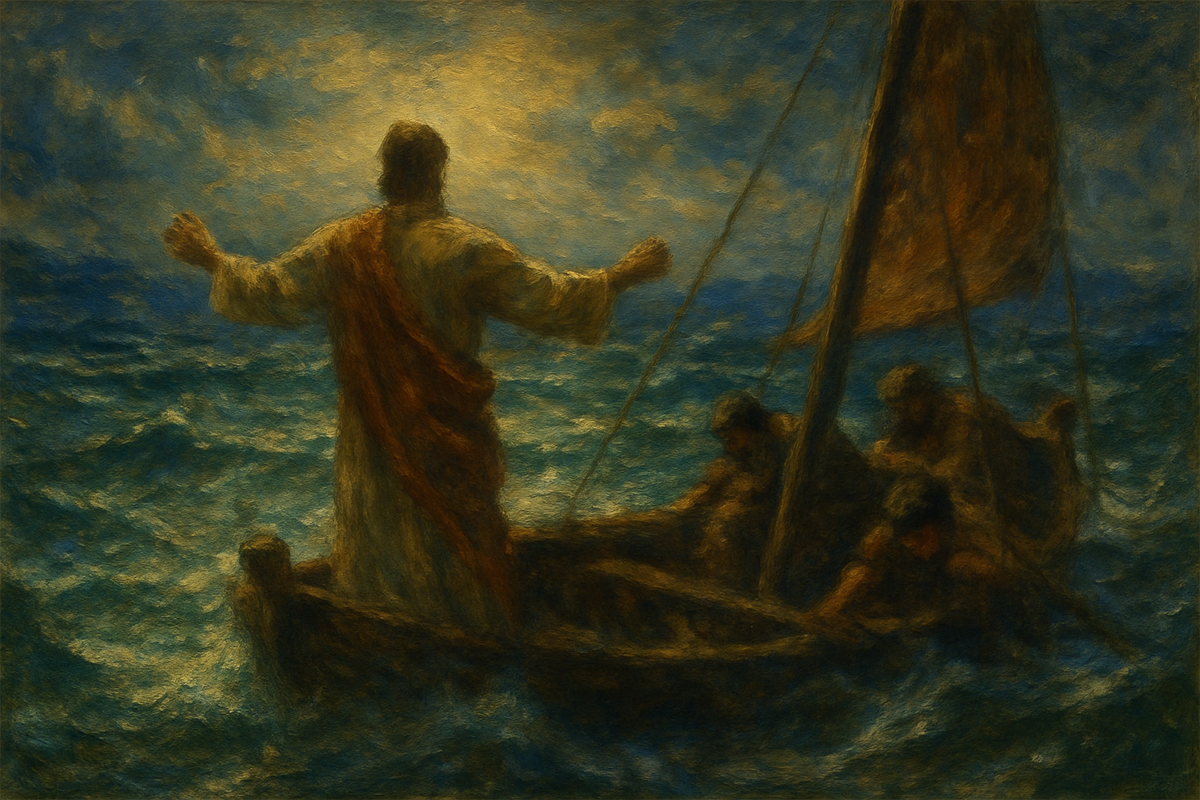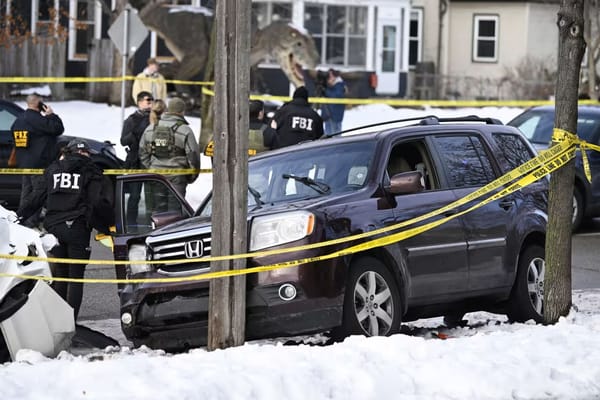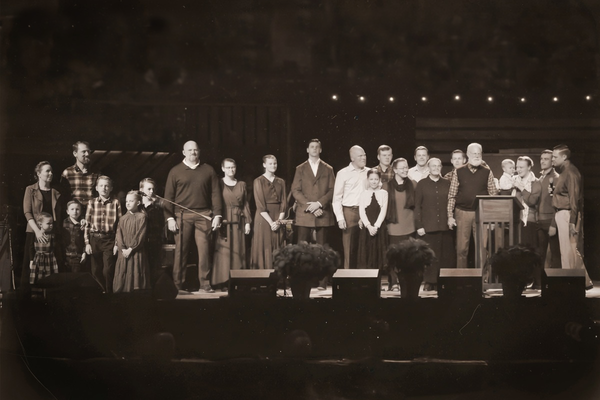Peace That Surpasses
We all long for peace—but too often we chase it through control, only to find it collapses when life unravels. True peace isn’t found in our grip on circumstances but in surrender to God’s greater plan. His love steadies us through every storm, even when understanding fails.

Adapted from Sunday’s preaching, August 17, 2025
Youth long for adventure. The insecure hunger for attention. The strong seek purpose. The weak reach for strength. But we all yearn for peace.
We call it security, dependability, faithfulness, trust—but at its core, it is peace. The spoken and unspoken calm of the soul: toward the past, the present, the future; toward God, toward self, and toward each other.
And it is sobering to realize that the opposite of peace is war. Conflict, uncertainty, upheaval, loss, the sundering of bonds—death itself. Every absence of peace describes some kind of war: a war of the mind, of relationships, a war against circumstances and realities themselves.
The need for peace is so universal that we all embark on its pursuit. The problem is this: we adopt methods that bring “peace,” and we become dependent on them—only to discover that the calm they provide is temporary, which proves no peace at all.
Many spend their lives mastering the mental and relational tools that can secure a “peace” which holds in peacetime but collapses when confronted with the blind curves, upheavals, betrayals, and the final realities of tragedy or aging and dying. And this is how our attempts at peace become a kind of con we play on ourselves.
Peace through Control
When we are young, we equate uncertainty and upheaval with weakness: “Things went badly because they were stronger and I was weaker. When I am stronger, they will no longer go badly for me.”
So we begin to equate peace with power, with control.
- Things went badly because I lacked money; if I gained enough wealth, things would not go badly.
- Things went badly because I lacked influence; if I secured sufficient influence, they will not go badly.
And to some extent, this seems to work. But it is peace through control—a calm and rest grounded in the illusion that we have the variables under our grasp. We pull the levers. We make the demands. And at least within the sphere of what is most precious, we convince ourselves that we have things under control.
Dominion—A Necessary but Insufficient Stage
So is it entirely wrong for human beings to pursue this kind of control, to feel settled when they have achieved it to a sufficient degree? I would say it is not wrong. Rather, it describes a stage in our journey through life and in our relationship with God. It is essential, but ultimately it proves insufficient.
This kind of peace, when seen rightly, can be understood as dominion. And we, as the human race, have been tasked by God with dominion: “Fill the earth and subdue it; have dominion . . . .”
Dominion under Command
Our dominion is always subsidiary to His place in our lives and His authority to guide us. That means our dominion can never become an unlimited grasp for control but rather must remain a guided effort under His word.
And that’s the rub: as long as control is submitted to a greater control—a greater word, a greater voice, a greater Creator—then it is not only legitimate but essential for peace.
But we become addicted to the narcotic of control. We start to believe that things are going well not because we have submitted to the rhythms, the design, and the commands of the Lord, but because we are in the driver’s seat—acting as ruler, master, and lord ourselves.
The Limits of Human Control
Let me pause here. God commanded us to take dominion—but not over our own souls, not over our salvation, not over our fellowship with Him, and certainly not over the vast sweep of realities utterly beyond our reach.
Instead, He entrusted us with dominion over the natural, the practical, the immediate responsibilities under our care. And even that dominion is good only insofar as it flows from obedience, which testifies that His sovereignty is ultimate.
When we remain mindful that our stewardship is legitimate only in submission to One greater, then we can yield the reins—placing the gear shift, the throttle, the steering wheel into the Master’s hands—and rest.
But if we deceive ourselves into thinking our authority is good because we are the ones calling the shots, then when we reach the limits of what our minds can comprehend and our strength can sustain, we will panic. We will implode. And we will remain there until we repent of the role we have usurped and return it to the One to whom it belongs.
Loss and Trust
I remember as vividly as yesterday standing in McLane Children’s Hospital in Temple, Texas. Eight years ago this very month, Zain and Hannah endured the agony of their baby’s decline over nine days, ending in his passing.
I remember the questions, the prayers, the uncertainty—but also the undergirding trust of God’s arms upholding us through it all.
I remember the head pediatrician, Dr. Doughty, stepping out of the room where Zain and Hannah, young and with their first baby, were praying, deciding, suffering all the pain and uncertainty imaginable. She said:
“These Homestead women amaze me. Their grace, their courage—their strength in the face of such loss—I’ve never seen anything like it.”
I don’t say this to pat us on the back, but to point in the right direction. If I thought we were perfected, I wouldn't waste my time preaching. But I want us to grow. I want to see what God has given us bud, flower, and flourish into the grace and power that overcomes the world.
The Long Con of Control
So how can our view of control become a long con we play on ourselves? By deceiving ourselves into believing that the mechanisms which work for the natural and practical will also work for the greatest trials of life—disease, betrayal, failure, death.
They will not.
If our seasons of dominion have kept us humble and anchored in the voice who commanded dominion in the first place—if we exercised control not as masters but as stewards—then when we come to the mouth of the chasm of life’s great unknowns, we can say, “I know Someone. I work for Someone who can handle this and so much more.”
But if, through our control, we have separated ourselves from His voice, His presence, His plan—then when we come to that chasm, we will not fly. We will plummet. We will shatter. We will blame, thrash, and perish.
A Journal Entry
Thursday morning, August 14, 2025, I wrote in my journal—my wife and my phone are witnesses to these words:
“If control can, in fact, be maintained, then it is the wisest path to security. If, however, it is an illusion and can never be maintained—because car wrecks will happen, lymphoma will happen, stillbirths will happen—then it is the shortest path to dismantlement. So what is the path to peace? It is finding and trusting an overarching, bigger plan that persists and even advances amidst all the chaos and explosion of our smaller plans.”
There are two categories of life:
- Things we are called to control—but only as stewards.
- Things we are not called to control—but must trust Him to handle.
And His handling is not about persuading our heads of the logic of His strategy, but persuading our hearts of the goodness of His character and the power of His love—both far beyond our comprehension.
True Peace
Rome offered a kind of peace: the Pax Romana, peace through strength.
But Jesus said: “Peace I leave with you; My peace I give to you—not as the world gives.”
And again: “In the world you will have tribulation. But take courage; I have overcome the world.”
His victory over the world would mean nothing if it were not offered to us as precedent and as grace—a disarmament we must step into and take possession of.
Jesus is the forerunner, the captain, the pioneer of salvation. He has gone ahead, and by His sacrifice, He has sabotaged the enemy camp, making a spectacle of their weapons and their threats.
But we must still march into the courts of trial, into battlegrounds of pain, betrayal, affliction, and lies. There, we trust the Master has gone ahead—that the atomic weapons aimed at our faith have already been defused, that the bullets of accusation have been turned into blanks against a faith and a soul stronger than death.
Not because our bodies are invincible, nor our hearts impervious to pain, but because He has made our faith invincible, our love unshakable, our trust indestructible.
He has done too much for us to let doubts keep doing the devil’s bidding—destroying us instead of merely wounding us.
Beyond Understanding
There is peace through understanding, yes. But when peace is most needed, it comes not through understanding but through Presence—the nearness of the One who sees the end from the beginning.
This is a peace that says: “I cannot get my mind around this, but I can get my arms around Him whose love I trust.”
But you cannot have “the peace of God, which surpasses understanding” until you receive “the love of Christ that surpasses knowledge, that you may be filled with all the fullness of God.”
I repeat: only when filled with that love that surpasses knowledge can your soul be stilled in the peace that surpasses understanding.
And that, brothers and sisters, is what this whole life is about.
That peace will be the bridge over troubled waters—even the final troubled waters of the Jordan itself.
It will carry us into a whole new reality: where God Himself will wipe away every tear, where sighing will cease, where sorrow will be no more.
And then His plan and goodness will be fully unveiled.
In that moment, we will know beyond all doubt that the peace He gives is not fragile, not conditional, not subject to unraveling, not capable of being lost. It is the peace of heaven itself.
And when that day comes—when all wars are ended, when all wounds are healed, when all storms are stilled—we will see that His peace has never failed us. It has carried us through every loss, every battle, every valley, every shadow.
We will be “filled with all the fullness of God.”
Yes—“God will be all in all”—and His shalom, our everything!
If you’ve experienced God’s peace in places where control slipped from your hands, share a thought, a scripture, or a story in reply—any comment or testimony from His surpassing goodness!





